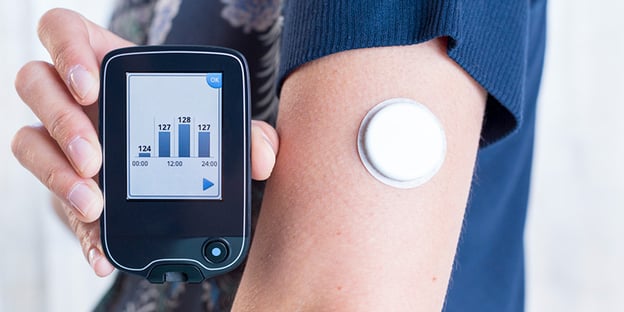If you had to guess, how much would you say you’ve spent on your diabetes over the years?
Think about it. Between doctor visits, treatments, diabetes-friendly foods, and other stresses on your checkbook, how much has the disease cost you in your lifetime?
According to the American Diabetes Association, the numbers are staggering. They suggest the average American with diabetes spends about $9,601 on diabetes-related medical expenses alone every single year. And that’s not counting decreased productivity, special groceries, and other diabetes-related costs.
But diabetes doesn’t just cost you money. It can also cause or worsen other medical conditions, known as comorbidities. And comorbidities can take a toll on your mental health and quality of life. Below, we’ll explore some of the most common diabetes comorbidities, how your diabetes can affect them, and how a continuous glucose monitor (CGM) can help.
Common Diabetes Comorbidities
The types of comorbidities you may experience depend a lot on the type of diabetes you have. Type 1 comorbidities include:
- Thyroid disorders, including Hashimoto's thyroiditis and Graves' disease
- Celiac disease
- Vitamin B12 deficiency
- Vitiligo
- Diabetic ketoacidosis
Comorbidities common to Type 2 include:
- Hypertension
- Heart disease
- Respiratory diseases
- Obesity
- Cancer
- Joint diseases
- Cardiac dysrhythmias
- Heart failure
- Retinal neuropathy
- Gum disease
- Polycystic ovary syndrome
Some comorbidities may stem from your diabetes, while others may predate them. Obesity, for example, can actually increase your risk of Type 2 diabetes. Many people are overweight before being diagnosed with diabetes. And some comorbidities, like foot conditions and sexual dysfunction, may appear with both types 1 and 2 diabetes.
Not only do these conditions add to your medical expenses, but they can also affect your quality of life. And your diabetes can also worsen them.
Dealing With Comorbidities
Your body isn’t a collection of separate systems. All your parts work together in some way, and problems with one system affect the others. So many of the same practices you’d do to manage your diabetes can also help you manage your comorbidities. Things like eating right and exercising can affect your insulin sensitivity and help ease the side effects of some comorbidities, like joint pain, or reduce your risk of developing others, like heart disease or obesity. And taking the right amounts of medication as prescribed, controlling your stress, and getting enough sleep are recommended to manage your diabetes and can help you feel your best.
Staying vigilant about your diabetes can also decrease your risk of developing kidney disease. If you’re having trouble controlling cravings for sugary sodas or desserts, it might be helpful to imagine the alternative. Would you rather switch to diet soda than undergo dialysis multiple times a week? When you consider that, it seems like an easy trade-off.
The same is true for sexual dysfunction, which can be a side effect of poor blood sugar control in men. When you consider the effects on your relationship and mental health caused by this condition, it makes that extra slice of cake seem far less appealing.
CGM and Comorbidities
Luckily, one ingredient in successful diabetes management can also help you manage or reduce your risk for comorbidities. If you’ve used a CGM in the past, you know it’s a great tool in your diabetes care strategy. But it’s not a solution itself. If you aren’t using the information you glean from it to modify your diet, exercise and other lifestyle habits, your diabetes symptoms won’t change. What you do with that information makes all the difference.
The same is true for your overall health. A CGM can give you valuable insight into how your habits impact your overall health. It can help you:
Manage your weight. High blood sugar can increase your appetite and cravings for sugary, high-carb, or fatty foods. And that can make it harder to control your weight. When your CGM helps you manage your blood sugar levels, you may find your appetite is curbed and meeting your weight loss or weight maintenance goals is easier. Well-managed blood glucose levels can also allow you, under the supervision of your health care team, to take less insulin, which can also help with weight loss. And when you get real-time data about how certain foods affect your blood sugar levels and how that can lead to decreased energy or other unpleasant side effects, it can make it easier for you to make healthy choices.
Avoid hypoglycemic events. Not only can radical dips in blood glucose zap you of your energy, but they can also lead to taking too much insulin or eating too much sugar, which can cause hyperglycemic events and their uncomfortable side effects, like a fast heartbeat, sweating, nervousness, and irritability. When you’re getting constant data about your blood glucose levels, it’s easier to avoid hypoglycemic events before they start.
Avoid injuries. Hypoglycemic events can also cause dizziness and confusion. And in the wrong setting — like behind the wheel of a car or crossing a busy street — those symptoms can be incredibly dangerous. When you avoid hypoglycemic events in the first place, you avoid the accidents they can cause.
Reduce glycemic variability. Managing your diabetes is all about consistency. And that goes for your blood glucose levels, too. You want to maintain levels that fall within the “normal range” (about 70 to 100 mg/dL). Highs and lows aren’t just uncomfortable. They can do serious damage to your blood vessels, which can lead to cardiovascular issues.
Improve your mental health. Stress can affect your blood sugar levels. And when those levels are too high or too low, you feel worse. That can lead to even more stress, which can further increase your levels, and so on. When your levels are under control, you feel better and have more peace of mind.
What Affects Your Blood Sugar?
Because so many comorbidities are affected by your blood glucose levels, it’s important to know what affects those levels. And the answer? More than you know. It’s not just what you eat. According to Diatribe.org, there are at least 42 things that can affect your blood sugar, including:
- What times you eat
- How much caffeine you drink
- Alcohol consumption
- Dehydration
- Steroids
- Vitamin B12
- Medication dosage and timing
- Stress
- Illness
- Lack of sleep
- Allergies
- Menstruation
- Puberty
- Smoking
- When you take insulin
- Exercise
- Outside temperature
- Sunburn
- Altitude
With all those factors at play affecting not just your diabetes but also your overall health, it’s nice to have a tool that can make it easier to keep track of your blood glucose levels and how they affect your health and wellbeing. That’s why we love CGMs so much. They track everything for you so you can make the best decisions for your health and feel your best.
How to Get a Continuous Glucose Monitoring System
Ready to get started with a CGM system? We can help. Total Medical Supply is a premier medical supply provider specializing in continuous glucose monitors and supplies, as well as diabetic testing supplies. We’ve made it easy to get a CGM system by creating a helpful fact sheet to share with your health care team. Consult with your health care provider to determine if a CGM system is right for you.
Here are the steps to take to advocate for a CGM system:
- Print the CGM Fact Sheet.
- Present the CGM Fact Sheet, using the EHR system or at the next appointment.
- Point out which CGM system will work best for your unique needs. Remember, the Dexcom G6 has a 10-day sensor worn on the abdomen and the FreeStyle Libre 2 has a 14-day sensor that is worn on the back of the arm.
- Ask your doctor for a prescription.
It’s that easy!
Choosing a CGM system can be life-changing for patients with Type 1, Type 2, or gestational diabetes because it offers an easier, more comprehensive, and more convenient way to manage their health and improve their quality of life.
Find out if a CGM is right for you!







